Grimaldi is strengthening services for finished vehicle trade in Europe while at the same time building services for EV imports to there from China.
As one of Europe’s biggest providers of both vessel and terminal services for the automotive industry, Grimaldi provides a good scope on the issues that have affected it in 2024. Grimaldi and its subsidiaries provide finished vehicle services at 24 main ports in Europe (see box) for a range of major OEMs, including those importing significant volumes from China to Europe.
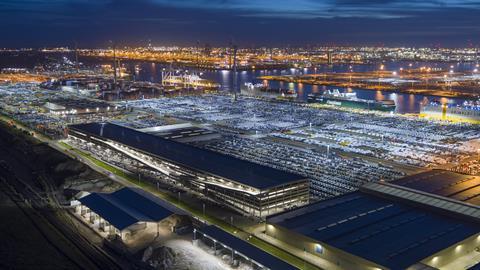
In fact, Grimaldi reports that the biggest volume of EVs it handled in 2024 were those originating from China destined for Europe and the company has deployed part of its fleet of pure car and truck carriers (PCTCs) to manage that trade and satisfy the demands of various Chinese manufacturers exporting to Europe and other global locations. Furthermore, a proportion of the 17 PCTCs currently under construction at Chinese shipyards will also be used to managed EV shipments ex-China to Europe. Five of those new vessels will be delivered in 2025.
All of Grimaldi’s vehicle terminals are equipped with EV charging stations.
Main Grimaldi automotive terminal operations
Belgium: Antwerp
France: Le Havre
Germany: Esbjerg, Hamburg
Greece: Piraeus
Italy: Catania, Civitavecchia, Gioia Tauro, Livorno, Monfalcone, Palermo, Salerno, Savona
Ireland: Cork
Morocco: Tangiers
Portugal: Setubal
Slovenia: Koper
Spain: Barcelona, Valencia, Vigo
Sweden: Wallhamn
Turkey: Borusan, Gemlik
UK: Portbury
Like others, Grimaldi highlights the Houthi attacks on cargo vessels navigating the Red Sea as the main disruption to trade and services in 2024, notably services between south-east Asia and Europe. Again, like others, Grimaldi’s vessels were obliged to change routes and circumnavigate the Cape of Good Hope, which resulted in an additional 15 days to transit times and higher operational costs, including fuel and insurance). Grimaldi also reports congestion at certain ports in Europe, including Livorno (Italy) and Portbury (UK) and Turkey.
Cars via Crete
Looking to new operations, Grimaldi has taken a majority stake in Heraklion port on the Greek Island of Crete and the company’s head, Emanuele Grimaldi, said last September that the port had “great potential for new trade routes for both passenger and freight transport, including cruises and vehicle shipments”. According to a spokesperson for Grimaldi, Heraklion is in a strategic location in the eastern Mediterranean and has great potential to play a role in finished-vehicle transport. In fact, Grimaldi used Heraklion as a transhipment port for a few shipments to the eastern Mediterranean in the autumn of 2024.
“We are currently working on the master plan of Heraklion where we foresee to upgrade the port’s facilities to handle new vehicles,” says the spokesperson.
Grimaldi also introduced a service between the Italian port of Trieste and the Turkish ports of Ambarli and Gemlik in September last year. Gemlik is close to Bursa, an important location for the production of spare parts for various vehicle manufacturers, and the main customers using the service are those shipping spare parts in trucks both ways, according to Grimaldi.
Grimaldi has also launched new liner services between Europe and India, and between China and west Africa, for the transport of rolling units, including finished vehicles.
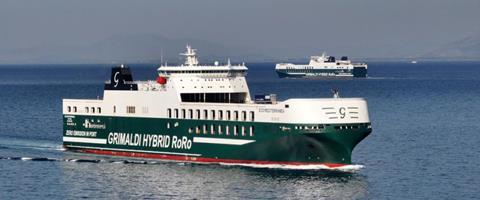
Rail connections
Regarding inland infrastructure, Grimaldi is building a multistorey vehicle storage facility at its terminal in the Belgian port of Antwerp. That will increase total storage capacity at terminal from 9,600 CEUs to 22,000 CEUs. “The expanded facility will allow us to better handle the volumes both in import and export,” says its spokesperson.
Antwerp Euroterminal is well connected to the European rail network for more sustainable finished vehicle movements and that is something Grimaldi’s Automar subsidiary has also introduced for shipments in Italy between Gioia Tauro to Pontecagnano.
“The rail connection linking Pontecagnano to Gioia Tauro has had benefits both from an economic and environmental point to of view,” says Grimaldi’s spokesperson. “For example, for vehicles produced in Pomigliano d’Arco (near Naples), the transport to Pontecagnano by road and from there by rail, reduces by 84% the CO2 emissions compared to a transport by road only between Pomigliano and Gioia Tauro.”
Grimaldi is also building a vehicle terminal at the port of Amsterdam, through its subsidiary Amsterdam Multipurpose Terminal (AMT), with the intention of importing new vehicles to northern Europe.
Emissions regulation
European regulation on cargo shipments by ocean aim to encourage decarbonisation of vessels but the increase in costs for those that do not cut emissions could trigger a modal backshift to road, Grimaldi warns.
“Both the EU Emissions Trading System (ETS) and FuelEU Maritime measures will make maritime transport less competitive compared to other modes of transport within Europe, although it is the most environmentally friendly mode of transport,” says Grimaldi’s spokesperson. “ETS has also favoured the role of non-EU ports, making them a more convenient option to the European ones, with direct impact on network strategies.”
As with a number of providers of maritime vehicle logistics service in Europe, Grimaldi Group is investing in a massive programme of hybrid ships with a unique technology that allows zero emissions in port. The 17 new PCTCs under construction will be equipped with such technology and this will automatically make operations more sustainable in every port served, according to the company.






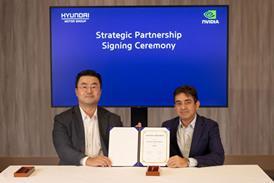













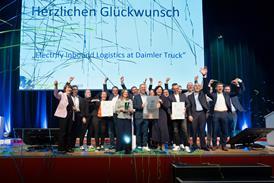

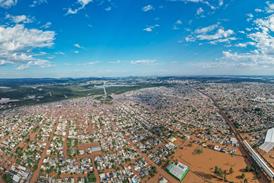
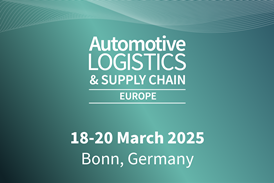




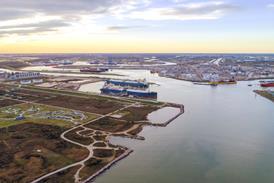
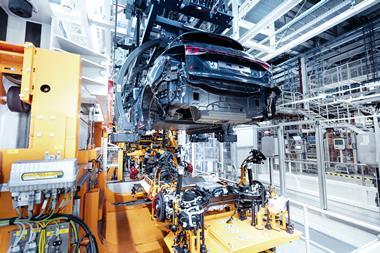

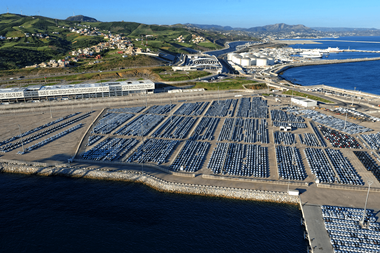
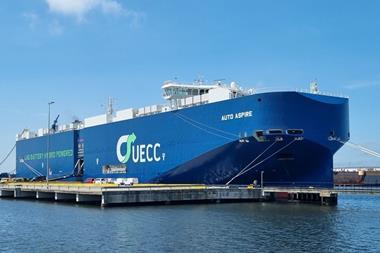

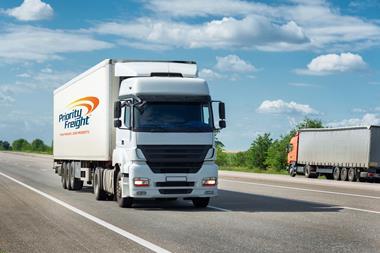
No comments yet